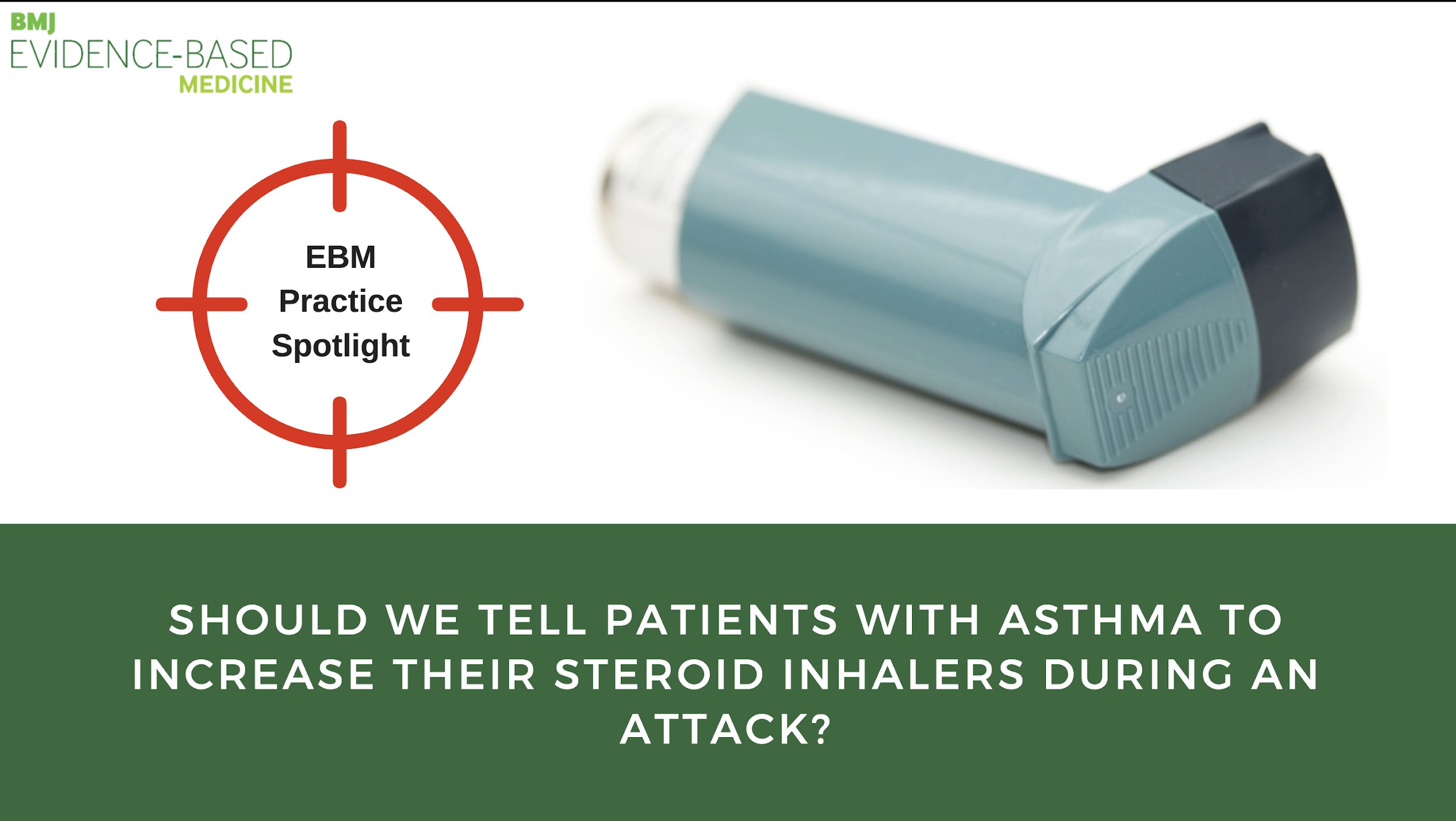EBM Practice Spotlight highlights new evidence that challenges current clinical practice
Kamal Mahtani
 Asthma is a long-term condition affecting more than 300 million people (adults and children) worldwide. In the UK, it affects about 1 in every 10 people.
Asthma is a long-term condition affecting more than 300 million people (adults and children) worldwide. In the UK, it affects about 1 in every 10 people.
When asthma management is effective, patients should be able to continue their normal activities of daily living, free of asthma-related symptoms (cough, wheeze, and shortness of breath); not waking up at night with symptoms, and with good exercise tolerance. A pivotal objective is to prevent asthma attacks. Over 1000 patients in England died of asthma-related causes in 2014. Across the globe, about 250,000 people are estimated to die each year as a result of asthma.
Most management of asthma occurs in primary care, about 2-3% of all consultations being asthma related. GPs, nurses, and patients can use guidance from the British Thoracic Society to support this. Many patients with asthma now have personalised action plans, to help them stay on top of their asthma, to recognise when things are getting worse, and in that case to know what to do.

A Cochrane review showed that effective education on self-management significantly improved health outcomes (e.g. reduced hospital admissions and days off work and improved quality of life) for adults with asthma.
Unfortunately, acute asthma exacerbations remain an inevitability for some. Management should always be prompt, but the nature varies based on the severity: moderate, severe, or life-threatening. Many moderate exacerbations are managed in the community. Individualised action plans usually begin by instructing the patient to increase the use of a salbutamol inhaler. In contrast, increasing the use of inhaled corticosteroids (ICS) during a moderate attack of asthma is not currently recommended. Another Cochrane review showed that patients who took an increased dose of ICS during an attack did not do better than those who took a placebo. However, the authors highlighted uncertainty and cited the need for a large randomized controlled trial to provide more definitive conclusions.
Recently, such a trial was published in the New England Journal of Medicine. FAST (the four-fold asthma study), was a large, pragmatic, unblinded, randomised trial involving adults and adolescents with asthma. The study, funded by the NIHR Health Technology Assessment programme, randomised 1922 asthma patients (aged 16 and over) either to receive a self-management plan that advised them to quadruple their ICS or to continue with their normal dose of ICS should their symptoms deteriorate. The groups were otherwise treated the same. The authors concluded that patients whose action plans included quadrupling their use of ICS went on to have fewer severe exacerbations of asthma (45% vs 52%).
The FAST study had some strengths (e.g. size and generalisability) but also some limitations. First, it was a pragmatic unblinded study; in other words, the participants and clinicians were aware of the treatments being used. This introduces the possibility of performance bias, although the authors argued that this reflected the beneficial effects likely to be seen in clinical practice. The authors also confessed that they had hoped to see a 30% reduction in the incidence of asthma exacerbations, to confirm a clinically significant difference. In contrast, they observed only a 19% reduction, albeit statistically significant, in the incidence of severe exacerbations; in other words, the reduction was smaller than they expected.
The findings were also challenged by those of a similar study in children, published at the same time. The Step-up Yellow Zone Inhaled Corticosteroids to Prevent Exacerbations (STICS) study included 254 children with mild to moderate asthma, and the authors concluded that increasing the dose of ICS fivefold did not reduce the rate of severe attacks of asthma.
So where do these essential studies leave us in clinical practice? Based on the FAST study, quadrupling the dose of ICS for adults with asthma when deterioration occurs may reduce the risk of progression to a severe exacerbation, but the evidence has some limitations. In children, there is currently no convincing evidence to support increasing ICS doses. However, both of these studies should be systematically placed in the context of existing studies before current practice is changed. In the meantime, patients with asthma who are feeling worse should promptly follow the medical advice provided to them and consult a healthcare professional. Delaying this while waiting for a possible effect from increasing their inhaled corticosteroids should not be an option.
Kamal R Mahtani is a GP and Deputy Director of the Centre for Evidence-Based Medicine, Nuffield Department of Primary Care Health Sciences, University of Oxford. He is also an Associate Editor at the BMJ Evidence-Based Medicine journal and Director of The Evidence-based Healthcare MSc in Systematic Reviews
You can follow him on Twitter @krmahtani
Disclaimer: The views expressed in this commentary represent the views of the author and not necessarily those of the host institution, the NHS, the NIHR, or the Department of Health. The views are not a substitute for professional medical advice.
Acknowledgements: Jeffrey Aronson for helpful comments. Image from https://www.freeimages.com/photo/inhaler-1416700
Competing interests: KM receives funding from the NHS NIHR SPCR Evidence Synthesis Working Group and the NIHR Health Technology Assessment programme.